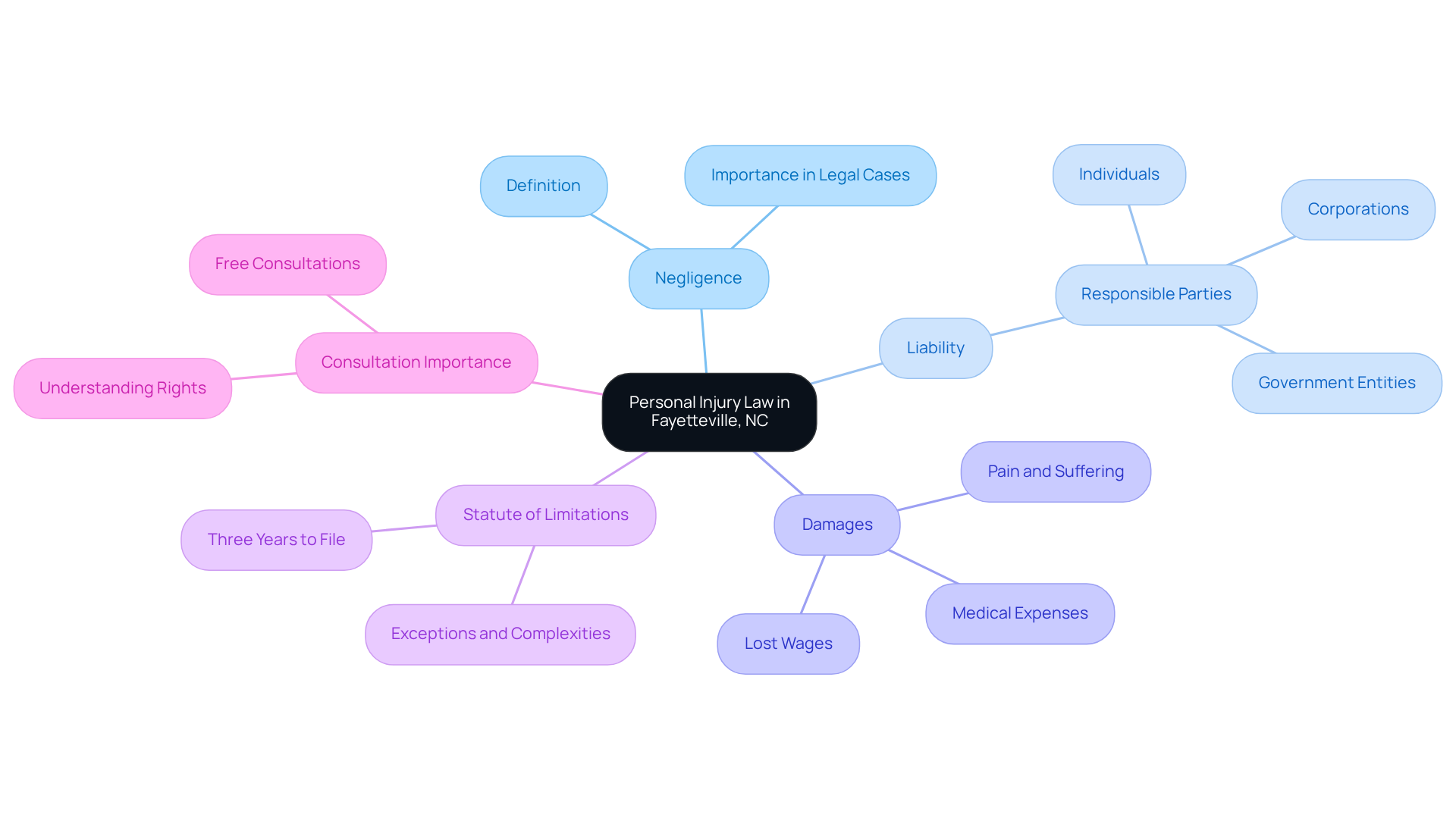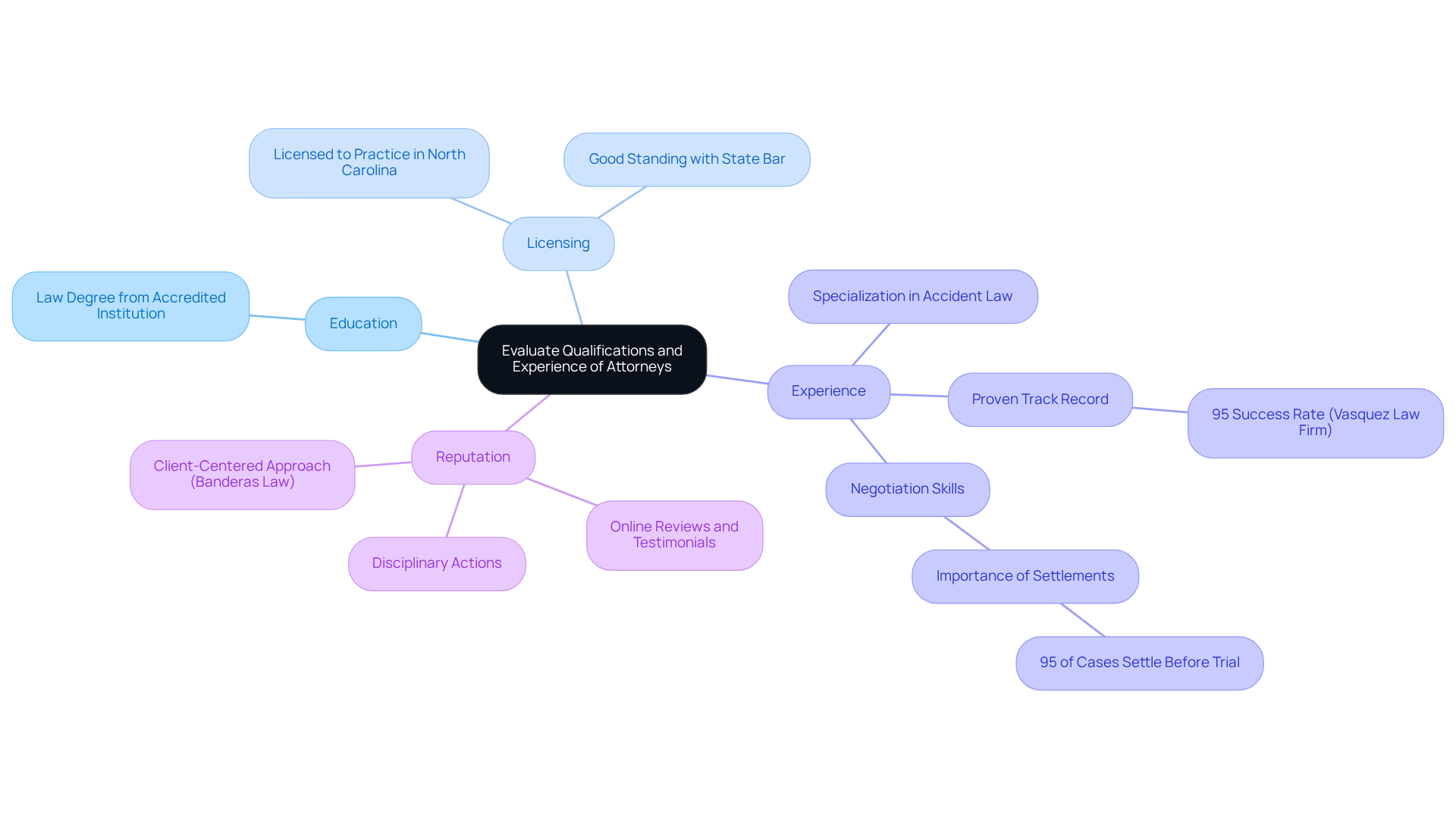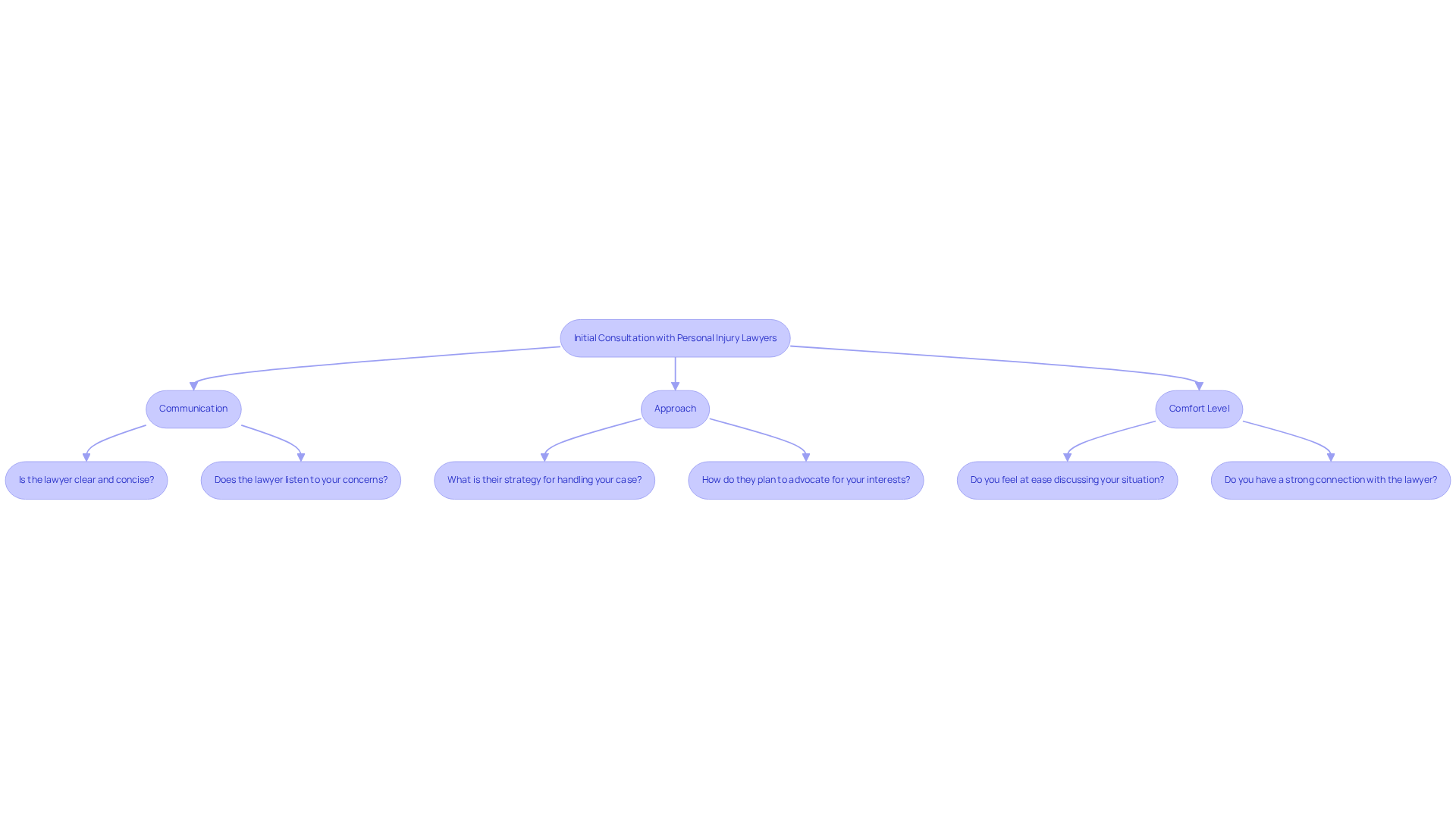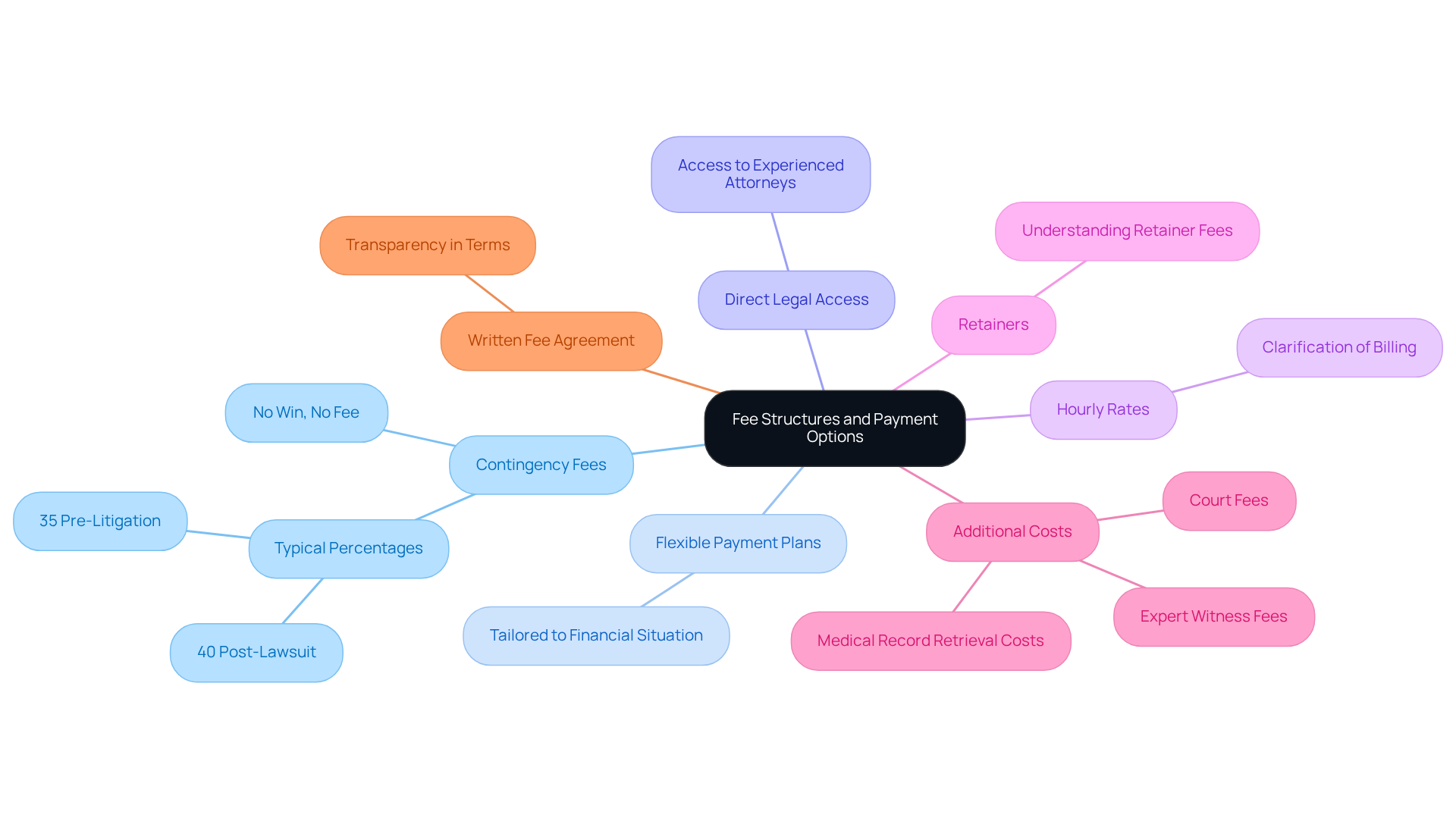Overview
Choosing a personal injury attorney in Fayetteville, NC, can feel overwhelming. It’s essential to evaluate their qualifications, experience, and fee structures. But don’t stop there—consider those initial consultations to see if you feel a connection.
Understanding personal injury law is crucial, and knowing your attorney’s track record can make a significant difference. Look for success rates and consider their communication style. These factors can greatly enhance your chances of a favorable outcome in your case. Remember, you’re not just hiring a lawyer; you’re finding someone to fight for you.
Introduction
Navigating the complexities of personal injury law can feel overwhelming, especially for those unfamiliar with the legal landscape in Fayetteville, NC. The potential for significant financial implications and the emotional toll of injuries makes selecting the right personal injury attorney a critical decision.
What factors should you consider to ensure you choose a lawyer who understands the intricacies of your case and aligns with your unique needs? This guide delves into essential steps for finding a qualified personal injury attorney, empowering you to make informed choices in your pursuit of justice.
Understand Personal Injury Law in Fayetteville, NC
Understanding tort law in Fayetteville, NC, is crucial before hiring a legal representative for damages. This area of law addresses situations where individuals suffer harm due to another party's negligence or wrongful actions. Common personal injury scenarios include vehicle collisions, slips and falls, and workplace accidents. Here are some key concepts to familiarize yourself with:
- Negligence: This means failing to exercise reasonable care, leading to harm. Establishing negligence is vital for your case, as it forms the foundation for liability.
- Liability: Identifying who is responsible for the harm is essential. This could involve an individual, a corporation, or even a government entity, depending on the specifics of the incident.
- Damages: These are the compensations you may seek for your injuries, including medical expenses, lost wages, and pain and suffering. Being specific in the damages claimed is crucial, covering medical bills, lost wages, and pain and suffering.
In 2025, the average compensation for bodily injury claims in North Carolina highlights the significant financial impact of such cases, with medical costs alone totaling $448 billion nationwide. It's important to know that individuals have three years from the date of an event to file a personal claim in North Carolina. As a North Carolina lawyer emphasizes, "Consulting a local attorney is crucial to understanding your deadlines and requirements."
For immigrant healthcare professionals, knowing your rights during workplace incidents is essential, especially if a third party was involved in your accident. You may have a separate personal injury claim against manufacturers, property owners, or contractors involved. The law surrounding these claims can be complex, and insurance companies often have legal teams ready to challenge your claims. Therefore, having knowledgeable legal representation is vital to navigate these challenges effectively. Additionally, seeking guidance from a legal professional before submitting any legal documents is recommended to ensure you fully understand your rights and options. By grasping these essential components, you can effectively communicate your situation to potential legal representatives and evaluate their capability to handle your case.

Evaluate Qualifications and Experience of Attorneys
When evaluating potential personal injury attorneys, it’s crucial to consider several key qualifications:
- Education: Confirm that the attorney holds a law degree from an accredited institution, ensuring a solid foundation in legal principles.
- Licensing: Verify that the personal injury attorney Fayetteville NC is licensed to practice law in North Carolina and maintains good standing with the state bar, which reflects their adherence to professional standards.
- Experience: Look for a personal injury attorney Fayetteville NC who specializes in accident law and has a proven track record of successful results. For instance, Vasquez Law Firm boasts an impressive 95% success rate in accident-related matters, having assisted thousands of harmed workers in obtaining the compensation they deserve. In 2025, accident attorneys will face challenges like changing legal regulations and aggressive insurance strategies, making experienced professionals essential. Furthermore, around 95% of personal injury cases are settled before going to trial, emphasizing the importance of selecting a skilled personal injury attorney Fayetteville NC who can negotiate effectively.
- Reputation: Investigate online reviews, client testimonials, and any disciplinary actions. A strong reputation often correlates with reliability and competence, as demonstrated by firms like Vasquez Law Firm, which has received positive feedback for their compassionate legal representation and successful outcomes. Moreover, difficulties in obtaining timely payments are frequent, emphasizing the financial elements of employing an experienced lawyer.
By thoroughly evaluating these factors, you can narrow down your options to legal representatives who are well-prepared to advocate for your interests and enhance your chances of a favorable result.

Conduct Initial Consultations and Assess Compatibility
Arrange initial meetings with your chosen personal injury lawyers to determine their fit for your unique situation. During these meetings, concentrate on these essential aspects:
- Communication: Pay attention to how the attorney communicates. Are they clear and concise? Do they genuinely listen to your concerns? Effective communication is vital for a successful attorney-client relationship.
- Approach: Ask about their strategy for handling your case. A skilled lawyer should articulate their approach and explain how they plan to advocate for your interests.
- Comfort Level: Assess your comfort level with the legal representative. You should feel at ease discussing your situation with them; a strong connection can significantly impact your experience.
Questions to ask include preparing a list of pertinent inquiries, such as their experience with similar cases, their average success rate—which tends to be notably high among personal injury attorneys in Fayetteville, NC—and how they manage client communication, specifically regarding a personal injury attorney in Fayetteville, NC.
Additionally, remember that initial meetings with injury lawyers, like those at Vasquez Law Firm, are typically free and come with no obligation. This opportunity allows you to discuss your situation without financial pressure. The firm operates on a contingency fee basis, meaning you pay nothing unless they succeed in your case, ensuring that financial constraints never prevent you from seeking justice. These consultations usually last between 30 minutes to 1 hour, providing ample time to delve into your circumstances. Bringing relevant documents, such as medical records and accident reports, can facilitate a thorough discussion.
By carefully evaluating these factors, you can select a lawyer who not only possesses the necessary qualifications but also aligns with your individual preferences, fostering a supportive and effective legal partnership. With direct access to skilled legal professionals at Vasquez Law Firm, you can feel confident that your matter is in capable hands.

Review Fee Structures and Payment Options
Before finalizing your choice of a personal injury attorney, it’s crucial to examine their fee structures and payment options:
-
Contingency Fees: At Vasquez Law Firm, we operate on a contingency fee basis for personal injury cases, meaning you pay nothing unless we win. This model significantly reduces financial stress during your recovery, allowing you to focus on healing rather than legal expenses by consulting a personal injury attorney Fayetteville NC. If we do not win your matter, you generally do not owe legal fees, but you may still be liable for specific costs such as court filing or expert witness charges.
-
Flexible Payment Plans: For other practice areas, we offer flexible payment plans tailored to your financial situation. This ensures that financial constraints never prevent you from seeking the justice you deserve with a personal injury attorney Fayetteville NC.
-
Direct Legal Access: You’ll have direct access to your legal representative throughout your matter. We don’t refer you to paralegals or junior personnel—you collaborate with seasoned attorneys who understand your situation thoroughly.
-
Hourly Rates: Some legal representatives may charge by the hour. It’s essential to clarify how they bill for their services and what specific tasks are included in their hourly rate. Understanding this can help you anticipate costs more accurately.
-
Retainers: If applicable, inquire about any retainer fees. Understanding how these fees will be applied to your case can prevent unexpected financial burdens later on.
-
Additional Costs: Be proactive in asking about any potential additional costs that may arise throughout the legal process. This includes court fees, costs for obtaining medical records, and expert witness fees, which can add up quickly. Typically, these costs are advanced by law firms and deducted from the final settlement.
-
Written Fee Agreement: Ensure that you have a written fee agreement that clearly explains all terms, including the handling of costs and expenses. This is essential for transparency and understanding your financial obligations.
By carefully reviewing these aspects, you can choose a personal injury attorney Fayetteville NC whose fee structure is transparent and aligns with your financial situation, ensuring a smoother legal journey.

Conclusion
Choosing the right personal injury attorney in Fayetteville, NC is a critical step towards securing the compensation and justice you deserve after an unfortunate incident. It’s essential to understand the intricacies of personal injury law, evaluate an attorney's qualifications and experience, conduct initial consultations, and review fee structures. This knowledge empowers you to make informed decisions that significantly impact your legal journey.
Grasping key concepts such as negligence, liability, and damages is vital—they form the backbone of personal injury claims. Selecting an attorney with relevant experience, a solid reputation, and effective communication skills is necessary. Additionally, understanding fee structures, particularly contingency fees, can alleviate financial stress during recovery, ensuring that legal representation is accessible.
Ultimately, the process of selecting a personal injury attorney should not be taken lightly. Prioritize compatibility and communication to foster a strong attorney-client relationship. By following these guidelines and conducting thorough research, you can navigate the complexities of personal injury law with confidence. Taking the time to choose wisely can lead to a more favorable outcome and peace of mind during a challenging time. Remember, we’re here to fight for you.
Frequently Asked Questions
What is personal injury law in Fayetteville, NC?
Personal injury law in Fayetteville, NC, involves legal cases where individuals suffer harm due to another party's negligence or wrongful actions, including scenarios like vehicle collisions, slips and falls, and workplace accidents.
What is negligence in personal injury cases?
Negligence refers to the failure to exercise reasonable care, which leads to harm. Establishing negligence is critical for a personal injury case as it forms the basis for liability.
How is liability determined in personal injury cases?
Liability involves identifying who is responsible for the harm caused. This can include individuals, corporations, or government entities, depending on the specifics of the incident.
What types of damages can be claimed in a personal injury case?
Damages in a personal injury case may include compensation for medical expenses, lost wages, and pain and suffering. It is important to be specific in claiming these damages.
What is the average compensation for bodily injury claims in North Carolina?
In 2025, the average compensation for bodily injury claims in North Carolina reflects a significant financial impact, with medical costs alone totaling $448 billion nationwide.
How long do individuals have to file a personal injury claim in North Carolina?
Individuals have three years from the date of the event to file a personal injury claim in North Carolina.
Why is it important to consult a local attorney for personal injury claims?
Consulting a local attorney is crucial to understanding deadlines, legal requirements, and the complexities of personal injury claims, especially when dealing with insurance companies.
What should immigrant healthcare professionals know regarding workplace incidents?
Immigrant healthcare professionals should be aware of their rights during workplace incidents, particularly if a third party was involved, as they may have a separate personal injury claim against responsible parties.
Why is legal representation important in personal injury cases?
Having knowledgeable legal representation is vital to effectively navigate the complexities of personal injury claims, especially since insurance companies often have legal teams ready to challenge claims.
What is recommended before submitting any legal documents in a personal injury case?
It is recommended to seek guidance from a legal professional before submitting any legal documents to ensure a full understanding of your rights and options.




